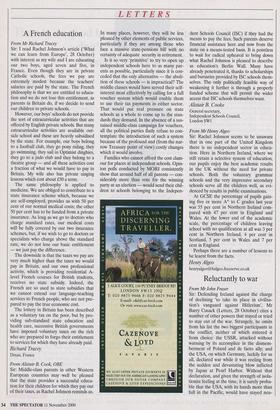LETTERS A French education
From Mr Richard Tracey Sir: I read Rachel Johnson's article ('What we can learn from Europe', 28 October) with interest as my wife and I are educating our two boys, aged seven and five, in France. Even though they are in private Catholic schools, the fees we pay are extremely modest because the teachers' salaries are paid by the state. The French philosophy is that we are entitled to educa- tion and we do not lose this entitlement, as parents in Britain do, if we decide to send our children to private schools.
However, our boys' schools do not provide the sort of extracurricular activities that are offered by English private schools. But many extracurricular activities are available out- side school and these are heavily subsidised by the state. For example, our boys belong to a football club, they go pony riding, they go swimming, they sail in Optimist dinghies, they go to a judo club and they belong to a theatre group — and all these activities cost a fraction of what we would have to pay in Britain. My wife also has private singing lessons which cost about £50 a term.
The same philosophy is applied to medicine. We are obliged to contribute to a state insurance scheme which, because we are self-employed, provides us with 50 per cent of our normal medical costs; the other 50 per cent has to be funded from a private insurance. As long as we go to doctors who charge standard rates, our medical costs will be fully covered by our two insurance schemes, but, if we wish to go to doctors or specialists who charge above the standard rate, we do not lose our basic entitlement — we just pay the difference.
The downside is that the taxes we pay are very much higher than the taxes we would pay in Britain, and our own professional activity, which is providing residential A- level French courses for British students, receives no state subsidy. Indeed, the French are so used to state subsidies that we cannot extend our language-teaching services to French people, who are not pre- pared to pay the true economic cost.
The lottery in Britain has been described as a voluntary tax on the poor, but by pro- viding sub-standard state education and health care, successive British governments have imposed voluntary taxes on the rich who are prepared to forgo their entitlement to services for which they have already paid.
Richard Tracey,
Dinan, France


























































































 Previous page
Previous page